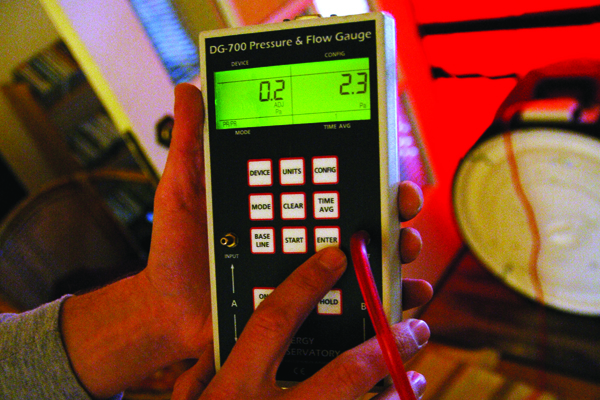 An energy audit could save you some serious cash
An energy audit could save you some serious cash
by Samantha Wittchen
With all of the options available to homeowners for improving the energy efficiency of their homes, determining where you can get the biggest bang for your buck can be difficult. Is it improving insulation? Air sealing? New windows? A home energy audit by a certified energy auditor can help you quantify the savings each option offers, allowing you to prioritize home improvement projects.
What is an Energy Audit?
A comprehensive energy audit evaluates how a home is losing energy and which improvements are most cost-effective. Most audits cover several areas: building envelope effectiveness, combustion appliance efficiency and indoor air quality.
To evaluate building envelope effectiveness and airtightness, a certified auditor will conduct a blower door test. A blower door is a high-powered, variable speed fan that mounts to an exterior doorframe. It is connected to gauges measuring pressure disparities between the inside and outside of the home, and the amount of air removed from the house by the fan. The blower door test amplifies any existing leaks in the house and makes them easier to pinpoint. It also provides a way to quantify airflow and the resulting heat loss.
In combination with the blower door test, some auditors use an infrared camera to inspect the house. Infrared scanning allows auditors to determine the effectiveness of a building’s insulation. Specially designed cameras create images (called thermograms) showing surface heat variations, indicating areas of heat loss and air leakage. According to the US Department of Energy, an infrared scan generates the most useful images when there’s a large—at least 20°F—temperature difference between indoor and outdoor temperatures, so scans are usually conducted in the winter and summer.
Energy auditors will also test air quality and safety to determine if the house is getting enough fresh airflow without becoming contaminated by combustion gases from things like the heating system. The auditor may conduct a Combustion Appliance Zone (CAZ) test to check for backdraft from any combustion appliances (such as a furnace). In addition to identifying combustion efficiency and safety issues, a CAZ test ensures that the air you breathe on a daily basis is safe.
After conducting the audit—which can take several hours and will vary depending on the size of your house and the complexity of the audit—the auditor should provide you with a report outlining the results, recommendations for improvements and anticipated cost savings. Some auditors do a complete computer modeling of your house using data about your home’s insulation, air leakage rate and combustion appliance efficiency. They can then adjust the model to simulate improvements, and using your past utility bill data, generate the potential cost savings of these improvements. Try to find an auditor that offers this service, as it will give you the most accurate picture of how future improvements will impact your home’s energy costs.
Hiring an Energy Auditor
The Building Performance Institute (BPI) and the Residential Services Network (RESNET) are the two main certifying agencies for energy auditors. When searching for an energy auditor, the first thing to look for is one or both of these certifications. They ensure that the auditor is well-qualified, and if you’re trying to get funding for an audit from an outside source (like the KeystoneHELP program), you’re often required to use an auditor with these certifications.
The KeystoneHELP program (keystonehelp.com) maintains a searchable directory of certified providers. So do BPI and RESNET, but auditors must pay to be listed in their directories, so you might not be getting a comprehensive list of qualified options in your area.
Once you’ve identified a few certified energy auditors in your area, ask them for references. Ask for a sample report, so you can see what information you’ll receive when the audit is complete. Also, try to find out if the auditor will come back and do a “test-out” (or follow-up evaluation) after you’ve made improvements, ensuring that they’ve been done properly and that you’re still getting the proper amount of fresh airflow.
Prices vary for energy audits, based on the size and complexity of the home, as well as the depth of the audit, but a typical range is $300 to $800. The KeystoneHELP program provides loans for energy audits, and they often result in a net gain for the homeowner—loan payments can be less than the energy cost savings realized.
We’ve compiled a list of qualified auditors to help you get started. So, really, what are you waiting for?
Chester County
This Leaky House
Drew McDowell
610-873-2121
Philadelphia
KO Angotti
Kara Angotti
717-880-9710
Greater Philadelphia
Hometown Green
610-627-4663
Greater Philadelphia
Altoonian Energy Services
Gary Altoonian
610-696-6072
Bucks County
ENEFEX
267-898-0123



Just want to know what are the basic consideration that we should be making in considering some professional auditor's to work for some legal and important document we have that would require some auditing skills.